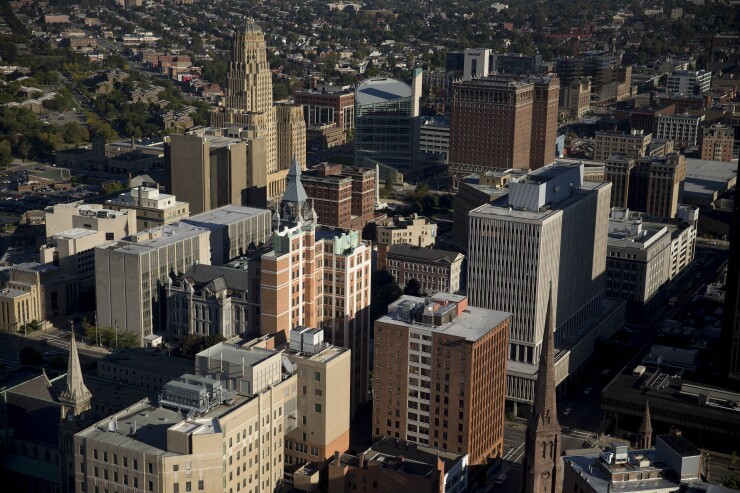With reserves running on empty, Buffalo Mayor Byron Brown is calling for the Western New York city’s first tax increase in 13 years.
Brown said in his budget address Tuesday that his proposed $513.6 million spending plan for the 2019 fiscal year, a nearly 3% increase, aims to realign revenue with expenses and decrease the city’s reliance on dipping into its fund balance. The budget plan, which needs Buffalo Common Council approval, would increase residential property taxes by 3.4% and commercial rates by 5.5%.

“As the city of Buffalo continues to experience strong economic growth, my administration is recommending a realignment of our fiscal plan which reflects the shift from a stimulus fiscal policy to a long-term investment policy,” said Brown in his budget remarks. “As Buffalo enters the next phase of its renaissance, it is time to realign our revenues, maximize our potential, embrace new technologies and continue the transformation of the city.”
Brown’s budget proposal comes afterf City Comptroller
“This is an important budget and it has to be real and it has to be disciplined and it is neither,” said Schroeder, who challenged Brown in last year’s Democratic primary. “The budget is fuzzy math.”
Schroeder said among the mayor’s revenue assumptions that he is concerned with are $17 million from casino revenue, $8 million in land sales, $6 million from traffic violations and $2 million from a planned new Public Facility Maintenance and Security surcharge at entertainment events. He said the residential and commercial tax increase would result in only about $6.5 million of new revenues.
Brown said Buffalo has changed dramatically since the city was
“With increased investment and visitors coming to Buffalo, our city’s expenses and potential revenues are evolving,” said Brown, who took over as mayor of New York State's second largest city in 2006. “Our commitment to budget predictability and accountability remains strong and this budget proposal opens new avenues to provide effective City services and continue Buffalo’s growth and progress.”
Buffalo has received three one-notch bond rating upgrades in the last five years and has ratings of A1 from Moody’s Investors Service, AA-minus from Fitch Ratings and A-plus from S&P Global Ratings.
Schroeder is concerned that all three have recently revised their credit outlooks to stable from positive. He said Brown has tapped into the fund balance too much to keep taxes flat and this strategy has put the city in a difficult spot.
“The mayor doesn’t have any fund balance left and that is concerning to me,” said Schroeder. “If the mayor doesn’t adjust the budget or it isn’t improved by the city’s common council it could lead to a re-hardening of the control board.”





